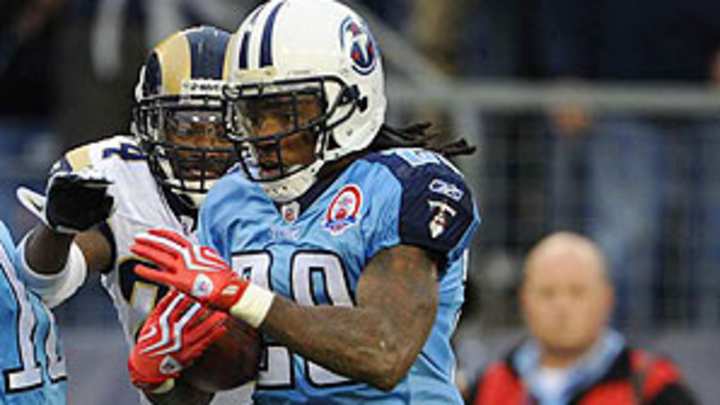How Johnson & Johnson clean up contract squabbles will affect NFL

And, as you may have heard, they both are seeking new contracts.
The amount of leverage each possesses is debatable, with several years remaining on each of their contracts. Chris Johnson has three more years on the $12 million deal he signed as a Tennessee rookie in 2008. Titans GM Mike Reinfeldt has publicly held firm against renegotiating. He also has cited the NFL's "30-percent rule," which stipulates that in the final capped year of the CBA -- like this one -- contract salaries can be increased by only 30 percent, although there are exceptions and loopholes.
As for Andre Johnson, the leverage seems even more flimsy, which probably was the biggest factor in his finally showing up for organized team activities Thursday. Johnson still has a whopping five years remaining on an eight-year extension he signed in 2007. His average salary over the remaining five years will be roughly $7 million, after already having received $15 million in guaranteed bonuses. Texans GM Rick Smith has a history of refusing to negotiate with players under contract that won't participate in on-field activities, and re-doing a contract with five years remaining is unprecedented in the NFL. Thus, when Johnson said he reported because he "didn't feel right being at home," it more than likely had as much to do with Smith refusing to even come to the table unless Johnson was on the field.
Yet both Chris and Andre Johnson are on the same mission: Get paid.
It's understandable, considering the short shelf-life of NFL players, the fact that salaries are not guaranteed and the terms of their current deals relative to others at their positions.
But who makes the stronger case? And as the league prepares to enter an era when rookie contracts should shrink and no one knows what will happen with the next CBA when it comes to guaranteed money and bonuses, what are the lessons every player should cull from this?
As much as they are in it for themselves, Johnson and Johnson represent much more than their own interests.
In the short-term, clearly Chris deserves the new deal more than his counterpart in Houston. Chris's financial pickle, after all, is a product of the system. Andre's gripe is more a product of his own decision to sign what proved to be a relatively substandard eight-year deal.
As the 24th overall selection in the 2008 draft, Chris was slotted in a particular range for a rookie contract, which for him guaranteed $7 million and paid $12 million over five years. That was the deal, until Johnson proved otherwise. He has done exactly that. Sure, the Titans have the right to negotiate tough, or not negotiate at all. But like every player in the NFL, the most important contract is not the first one, but the second, and Johnson has earned the right to talk.
In Andre's case, his second contract was a rewarding one at the time he signed it. Altogether, it was a $60 million package. But his decision to try to save a 3-percent agent commission by having his uncle Andre Melton take the lead as his negotiating advisor proved to be brutal. Also, since Melton is not certified by the NFLPA, by rule Johnson had to be the one actually doing the talking and negotiating with the club. Johnson may not have been fleeced, and he certainly will be well-compensated, but no legitimate, experienced agent would have agreed to the terms of Johnson's current eight-year deal.
Still, we should expect the Texans to at least restructure the remaining five-years, more than likely adding guaranteed money to the front end of the contract.
On a broader scope, the de facto holdouts by Johnson and Johnson this spring will affect CBA negotiations and future contracts. There most likely will be a rookie salary cap in the next CBA. What the Chris Johnson case probably will help spark is rookie contracts that are much shorter -- particularly for first-day draft picks. Agents will want nothing more than three-year contracts for prime rookie players, so they can get to bigger money, sooner, for players who prove to be viable NFL players. Larger incentive bonuses for rookies also will be more abundant.
And rest assured, every agent currently citing Master P's ridiculously bad negotiation of Ricky Williams' 1999 contract, now will be pointing to Uncle Andre's too-long deal. Players should leave negotiating to the professionals. Bad decisions and bad deals lead to uncomfortable situations that can't always be redone.
